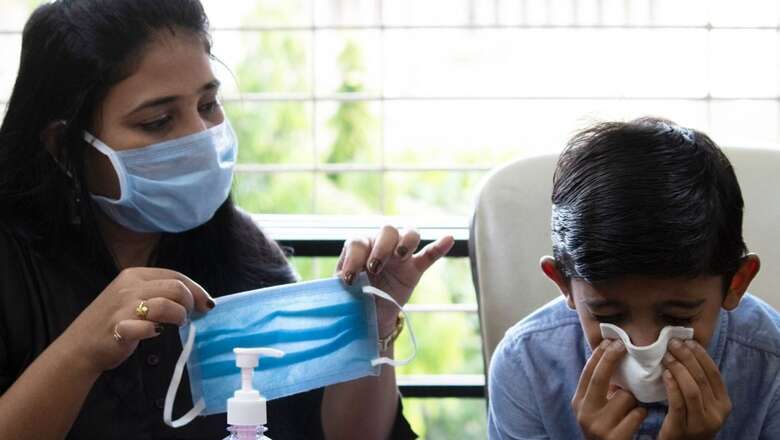
views
Delhi-NCR has been witnessing a surge in cases of high fever among children, mainly due to fluctuating weather conditions because of the transition from cold to warm season.
Paediatricians are seeing a high influx of admissions and visits to outpatient departments (OPDs) as anxious parents bring in their children, often with high fevers exceeding 101, at times hitting as high as 104.5 degrees Fahrenheit.
According to Dr RD Srivastava, head of the department, paediatric medicine and neonatology at New Delhi-based Sri Balaji Action Medical Institute, the surge in cases of viral fever among children is “concerning”.
“With daily reports of 15-20 cases in the outpatient department and five to eight admissions, our young ones are facing challenging situations owing to fluctuating weather conditions.”
Srivastava indicated that he has been seeing children reporting fever as high as 104.5 in some cases. Other doctors echoed similar trends.
Dr Veena Raghunathan, senior consultant, paediatric intensive care unit (PICU) at Amrita Hospital in Faridabad, has noted that every seven out of 10 kids coming to her hospital are suffering from such symptoms these days.
“Patients have been coming in with typically high temperatures exceeding 101 F, runny nose, throat pain, headache and dry cough. Parents are distraught as the fever shows only temporary or partial relief to paracetamol.”
Dr Praveen Makhija, principal consultant of paediatrics at Max Smart Super Speciality Hospital in Saket, also confirmed the trend. “I have been seeing around 10-12 cases every day,” he said, adding that parents need not be worried if a child is active and playful once the fever comes down. However, they must consult a medical expert if a child is dull and inactive.
“If the child is not eating well, hospitalisation is needed,” he advised.
New flu variant or influenza virus?
Experts believe that the changing weather and rising pollution levels worsen viral infections, creating an ideal environment for their spread.
“Fluctuating temperatures due to transition in weather from cold to warm seem to be the main reason behind the increase in viral infections,” Raghunathan said, sharing her experience that during peak winter, “a lot of infants and young children were affected with respiratory syncytial virus this year, but this is on the decline now”.
She believes that the current surge appears to be due to a “new flu variant”.
Moreover, experts believe that the unpredictable weather conditions and air pollution are exaggerating allergies and asthma in children and increasing the likelihood of infections.
Dr Dinesh Raj, paediatrician at Holy Family Hospital in Delhi, has also been seeing many such patients with acute onset high-grade fever along with respiratory or gastrointestinal symptoms. “Most of these are viral and turning out to be influenza. We are not testing routinely in outpatients for influenza as it is not indicated. But patients who are sick need to be tested,” Raj added.
What to do?
According to medical experts, practising hand washing and wearing masks in crowded public places can help to prevent the spread of these infections.
Children who are already suffering must get adequate rest and drink plenty of liquids to avoid dehydration.
“In viral fever, treatment is essentially supportive care,” Raj from Holy Family Hospital said. “We encourage bed rest and a lot of fluid intake. Paracetamol is given for fever. Ibuprofen can be given on a case-to-case basis. But hydration needs to be ensured as Ibuprofen is known to affect kidneys.”
Doctors stressed on avoiding unnecessary consumption of other medicines except paracetamol unless prescribed by a medical practitioner.
“Paracetamol should be used in correct doses to treat fever. It is the safest medicine,” Makhija said, adding that parents should refrain from self-medicating children with doses of mefenamic acid or ibuprofen. “They must give these medicines only under the doctor’s supervision.”
Doctors suggest that sponging with lukewarm water also helps to control fever, especially in small children. Also, in case of high fever, parents must try to make the child comfortable and avoid ‘over clothing’.


















Comments
0 comment